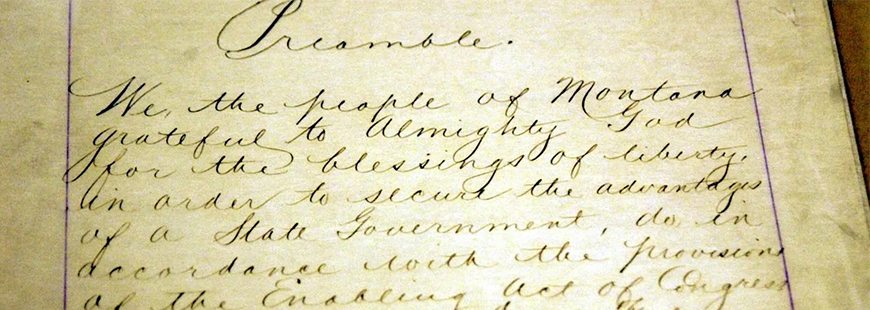VII.1. Judicial Power
The judicial power of the state is vested in one supreme court, district courts, justice courts, and such other courts as may be provided by law.
History
Sources
1884 Montana Constitution (proposed)
Art. VI, sec. 1.The Judicial powers of the State, as to matters of law and equity, except as in this Constitution otherwise provided, shall be vested in a Supreme Court, district courts, county courts, justices of the peace, and such other courts as may be created by law for cities and incorporated towns. But the Legislative Assembly may provide for the abolition of county courts and the transfer of their probate and other jurisdiction to the district courts, and in such case may provide that such district courts shall be always open for the transaction of business, except on legal holidays and non-judicial days.
1889 Montana Constitution
Art. VIII, sec. 1. The judicial power of the state shall be vested in the senate sitting as a court of impeachment, in a supreme court, district courts, justices of the peace, and such other inferior courts as the legislative assembly may establish in any incorporated city or town.
Other Sources
Hawaii, Art. V, sec. 1: The judicial power of the state shall be vested in one supreme court, circuit courts, and in such inferior courts as the legislature may from time to time establish. The several courts shall have original and appellate jurisdiction as provided by law.New Jersey, Art. VI, sec. 1: The judicial power of the state shall be vested in a Supreme Court, a Superior Court, County Courts and inferior courts of limited jurisdiction. The inferior courts and their jurisdiction may from time to time be establish, altered or abolished by law.
Puerto Rico Art. V, sec. 1: The judicial power of Puerto Rico shall be vested in a Supreme Court and in such other courts as may be established by law.
Drafting
Delegate Proposal
Proposal No. 44 (Loendorf): "The judicial power of the state shall be vested in a supreme court, in district courts and such other courts as say be provided by law; except that the legislature shall provide for impeachment proceedings in accordance with the provisions of this constitution." Montana Constitution Convention 1971-1972, vol. 1, 140. This proposal was rejected.
Delegate Proposal No. 92 (Arness): "COURT OF APPEALS. The judicial power of the state shall be vested in a Court of Appeals and in such inferior courts as the legislature shall establish." Id. at 205. This proposal was rejected.
Committee reports
Montana Constitutional Convention Commission Study No. 14 Suggested Constitutional Judicial Article, 324.
Section 1. The Judicial Power. The judicial power of the state is vested in [a unified judicial system] [one Court of Justice], which shall include a Supreme Court, [a Court of Appeals,] a Trial Court of General Jurisdiction, the geographic divisions of which shall be District Courts, [and special subdivisions of the Trial Court of General Jurisdiction known as Courts of Limited Jurisdiction]. All courts except the Supreme Court may be divided into geographic districts and into functional divisions and subdivisions as provided by law or by judicial rules not inconsistent with the law. The several courts shall have original and appellate jurisdiction as provided by law.
Judiciary Committee Majority Proposal
Section 1. JUDICIAL POWER. The judicial power is vested in a supreme court, district courts, justice of the peace courts, and such other courts as the legislative assembly may establish. Montana Constitution Convention 1971-1972, vol. 1, 486.
Comments of Judiciary Committee Majority Proposal The proposed revision eliminates the impeachment court from the judicial article because the reference is covered under Article V, section 16. The revision also replaced “justices of the peace” with “justice of the peace courts.” Finally, “[t]he l889 Constitution provided for vesting judicial power in ‘such other inferior courts as the legislative assembly may establish.’ This revision vests the power in ‘such other courts’ in anticipation of a need in the future for intermediate appellate courts. This language permits that to be done.” Id. at 493.
Judiciary Committee Minority Proposal
Section 1. JUDICIAL POWER. The judicial power of the state is vested in a supreme court and district courts and such other courts as may be provided by law. Id. at 510.
Comments of Judiciary Committee Minority Proposal
The proposed section allows a broad and flexible interpretation to accommodate present inferior courts and the possibility of future courts. The section also eliminates reference to a court of impeachment because it is already covered in the legislative article of the 1889 Constitution. In regard to the justices of the peace being removed as a constitutional court, the minority said, “[i]t should be pointed out that by deleting reference to justice of the peace, there is no intention to abolish or affect the present jurisdiction and operation of these courts, but rather to leave assignment of judicial power in these courts exclusively to the legislature where there is wide latitude for improvement and alterations that will adjust to the varying complexities of rural and urban problems in the administration of justice on the lower level.” Id. at 514-15.
Floor Debate
The Convention heard the Majority and Minority Reports and voted to use the Minority Report for a template on the Judiciary Article (49-37). Montana Constitution Convention 1971-1972, vol. 4, 1034.
Section 1 from the Minority Report was introduced by delegate Berg, and with little other discussion was adopted. Id. at 1036.
